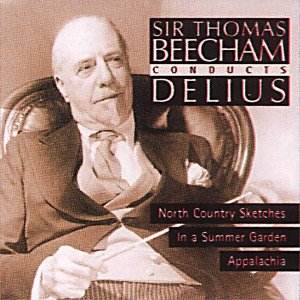With the exception of a handful of HMV/EMI tapes the
best sounding and latest Beecham-Delius recordings have been in the
hands of CBS (now Sony) and before that with Fontana and Philips in
the days of LP. I am not sure about In a Summer Garden but certainly
the Sketches and Appalachia were available on CBS mid-price
LPs in the early 1970s. Strange how, while the EMI-Beecham tapes have
rarely been out of the catalogue, the CBS/Sonys have constantly dipped
in and out of the retailers' shelves. About a year months ago the rarest
item - Beecham's Mass of Life was issued and is still around
to be snapped up in a delectable 2-disc version. At the same time a
single CD anthology was also issued. This present issue was announced
as part of a ‘suite’ of Beecham releases alongside a recital of Berlioz
overtures and two Mozart symphony discs.
Beecham's sympathy for Delius's hazy shimmering magic
is fully on display in the Sketches which are a degree or two
chillier as befits their moorland origins and, while we associate Delius
with warmer climes (his despising attitude to his native heath is well
enough known), we can link this work with his Nordic group including
Eventyr and Paa Vidderne. The bleaker sections of Autumn,
the wind soughs among the trees bring us face to face with the sounds
we hear in Arthur Butterworth's Moorland Symphony, Hadley’s The
Hills and in the bleaker Bax of Northern Ballad No. 2. I
have always loved this work and am extremely pleased that it has reappeared
on CD. When arranging concerts do not forget that this is one of those
works that is in four movements with each allocated to a season. Imaginative
programme planners could do worse than group Bridge's Summer,
Panufnik's Autumn, Foulds April-England and Wilfred Josephs'
Symphony No. 7 Winter, around this work. The present recording
was also previously issued in the early 1990s on SONY's British pageant
series (SMK58934) with Over the Hills, Eventyr and the
closing scene from Koanga (a shorter - by about 8 minutes - and
less substantial collection than the present offering).
The other two Beecham works derive from tapes which
appear here on CD for the first time. The honey warm idyll of In
a Summer Garden is less sensuously pagan than Bax's Spring Fire
but the dew-drop descending figures are similar. The last time I
heard this Beecham-Delius Appalachia was when I bought CBS LP
61354 in circa 1974. Both Appalachia and Garden are smooth
sounding with hiss largely eliminated. The 78 master origins of the
Sketches is proclaimed by the busy, though hardly intrusive,
surfaces. Appalachia sounds superb and its first ten minutes
will conquer any doubts you may have about this version - just listen
to track 6 at 3.40 to the sound of the magically jangling counterpoint
of the banjo-evocation (echoing from his time in Florida) rising to
a wonderfully sustained climax. In the finale the tenor's slightly mannered
delivery is offset by the glories of the choral singing in what must
be the briefest role for a choir in a work that plays for circa 35 minutes.
It is archetypical of the theme of transience, ephemeral glory and passing
time that Delius should set the words Oh honey I am going down the
river in the morning. Much the same sense can be felt and experienced
in the closing scene of A Village Romeo And Juliet as the two
lovers are carried down the river to the ecstasy that is oblivion. This
is also in the same spirit as Sea Drift which embraces loss -
hymning its glory in the setting of the sun.
Sony do not say so on the outside of the jewel case
but these performances are, of course, in mono though such a 'shortcoming'
is totally outweighed by the myriad glistening dimensions which Beecham
bring to all this music.
The exceptionally informative (English only) booklet
note is by Graham Melville-Mason. SONY are to be congratulated for their
design decisions on the series. Their superbly detailed typography and
black on white approach defeats the clever-clever design gurus whose
efforts often undermine those who write notes for CD booklets. Beecham's
famed sensitivity and response to nuance is in full spate here. All
that is missing is modern stereo sound. Such a pity that Norman del
Mar (a Beecham disciple) never recorded Appalachia. Barbirolli
is good too but Hickox is rather too fosued on grandeur at the expense
of sensitivity.
Rob Barnett
see also review by
Stephen Lloyd


